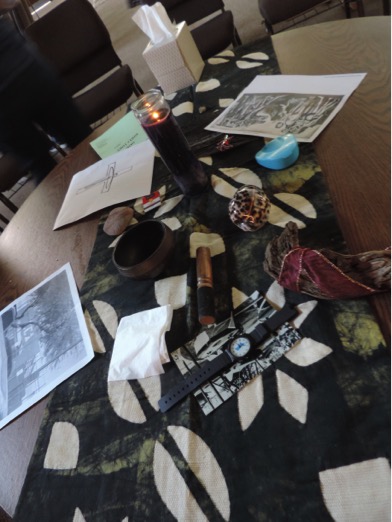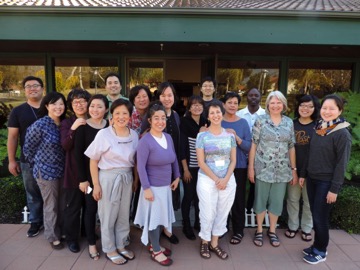“This is my symbol of trauma.”

I snapped open the blue container containing the mouth guard that my dentist had crafted specifically for my nighttime teeth grinding. After a few explanatory sentences I placed my container on the table and passed the talking stick to the friend on my right side.
This exercise, sharing our symbols of trauma, began the second day of training with Strategies for Trauma Awareness and Resilience (STAR) and ReconciliASIAN in Upland, California, last week. Our Level 1 training lasted the entire week with 16 participants and two trainers.
During the course of the week we covered a wide array of trauma topics, including “Unhealed Trauma and Cycles of Violence,” “Breaking Free From Trauma Across Cultures,” and “Resilience and Self Care for the Harmed and the Healers.” The content resonated with all of us, because we all carried our own wounded history; furthermore, the majority of participants, including myself, held roles as ministers and community volunteers where we encountered the trauma of so many other people, cultures, and nations.
As a VDS student, minister, and advocate, trauma often burrows its way into the soil of my communities. While the STAR training unearthed painful reflections and unanswered questions, it grounded us all in a transformative justice model that I now carry as an invaluable tool for the future.
Trauma is inevitable in our individual lives; working with people experiencing marginalization and pain opens up compounded trauma that often reaches in and touches our wounded parts. Trauma occasionally beats down the door to our hearts, leaving us flailing, vulnerable, and unavailable. I am fortunate to have the support of my husband, family, friends, and colleagues to sustain me through such times.
Near the end of our STAR training we were asked to bring a symbol of hope. Earlier that morning I gingerly picked up a blossom that had fallen to the ground. That flower reminded me of my friends facing freezing temperatures on the streets of Nashville that week. I was surprised to see that the faded pink blossom had found its way to the earth upside down. The design and beauty of its underside spoke a message of hope to me: even the discarded blossom is no less beautiful than the ones on the tree.
As I move through the liturgical calendar through Lent I am reminded of the need to lean in to desert places of trauma and also lean out to my own support system. We closed our STAR training reading this prayer written by Bishop Ken Untener in honor of Archibishop Oscar Romero:
It helps, now and then, to step back and take a long view.
The Kingdom is not only beyond our efforts, it is even beyond our vision.
We accomplish in our lifetime only a tiny fraction of the magnificent enterprise that is God’s work.
Nothing we do is complete, which is a way of saying that the Kingdom always lies beyond us.
No statement says all that could be said.
No prayer fully expresses our faith.
No confession brings perfection.
No pastoral visit brings wholeness.
No program accomplishes the Church’s mission.
No set of goals and objectives includes everything.
That is what we are about.
We plant the seeds that one day will grow.
We water seeds already planted, knowing that they hold future promise.
We lay foundations that will need further development.
We provide yeast that produces far beyond our capacities.
We cannot do everything, and there is a sense of liberation in realizing that.
This enables us to do something, and to do it very well.
It may be incomplete, but it is a beginning, a step along the way, an opportunity for the Lord’s grace to enter and do the rest.
We may never see the end results, but that is the difference between the master builder and the worker.
We are workers, not master builders; ministers, not messiahs.
We are prophets of a future not our own.[1]

_____________________________________________________________________
[1]Ken Untener, preface to The Practical Prophet, by Ken Untener (Mahwah, NJ: Paulist Press, 2007), i.
 Teresa Kim Pecinovsky has a master of education degree in reading and language arts from The University of Houston and is currently pursuing the master of divinity degree at VDS. She worked in her 2014-2015 field education internship as an outreach intern with Open Table Nashville, a homeless outreach nonprofit organization. Teresa currently serves as the English Ministry (EM) Pastor at Nashville Hanshin Christian Church (Disciples of Christ).
Teresa Kim Pecinovsky has a master of education degree in reading and language arts from The University of Houston and is currently pursuing the master of divinity degree at VDS. She worked in her 2014-2015 field education internship as an outreach intern with Open Table Nashville, a homeless outreach nonprofit organization. Teresa currently serves as the English Ministry (EM) Pastor at Nashville Hanshin Christian Church (Disciples of Christ).
Bibliography
Untener, Ken. Preface to The Practical Prophet, by Ken Untener, 1. Mahwah: NJ: Paulist Press, 2007.